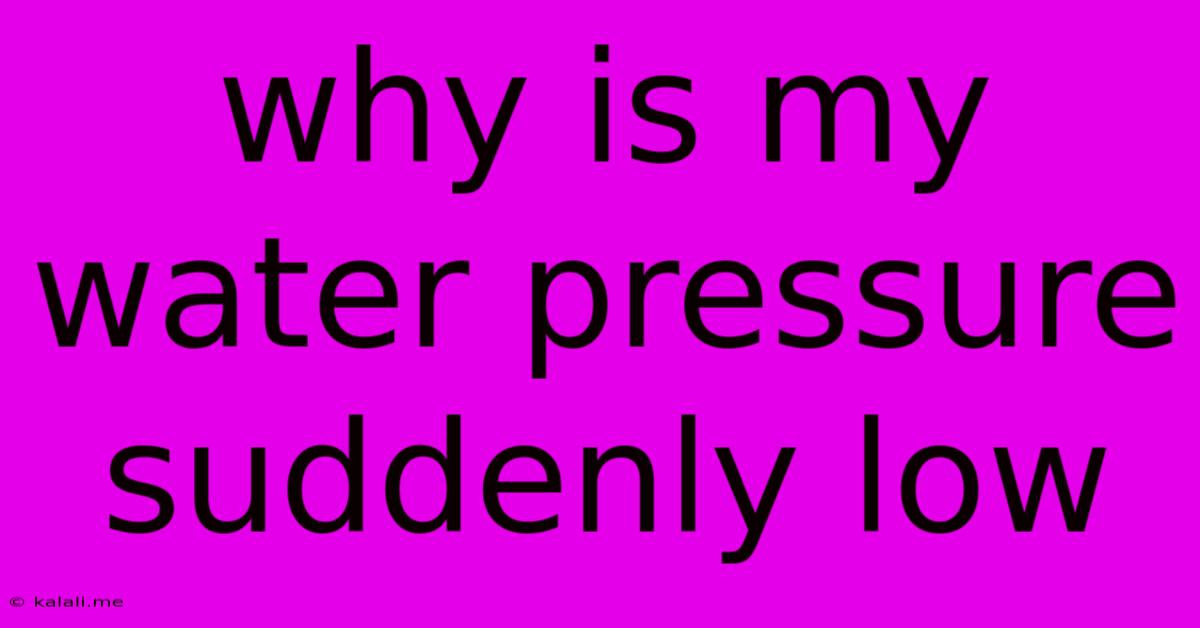Why Is My Water Pressure Suddenly Low
Kalali
Jun 02, 2025 · 3 min read

Table of Contents
Why is My Water Pressure Suddenly Low? A Troubleshooting Guide
Meta Description: Experiencing a sudden drop in water pressure? This comprehensive guide explores common causes, from simple fixes like checking your faucets to more complex issues requiring a plumber. Learn how to troubleshoot and restore your water pressure quickly and efficiently.
Low water pressure is a frustrating problem that can disrupt your daily routine. Whether it's a weak shower spray or a sluggish toilet flush, a sudden drop in water pressure demands attention. This article will guide you through the potential causes and offer practical troubleshooting steps to identify and resolve the issue, saving you time and potential plumbing costs.
Common Causes of Sudden Low Water Pressure
Several factors can contribute to a sudden decrease in your home's water pressure. These range from simple, easily fixable problems to more serious issues needing professional intervention. Let's break them down:
1. Clogged Faucets and Fixtures:
- The Problem: Mineral deposits, sediment build-up, or debris can restrict water flow within your faucets, showerheads, and other fixtures.
- The Solution: Begin by checking your faucets and showerheads. A simple cleaning might be all you need. Remove aerators (the small screens at the end of faucets) and clean them thoroughly. Descale showerheads by soaking them in vinegar or using a commercial descaling solution.
2. Low Water Pressure in the Entire Neighborhood:
- The Problem: A water main break, scheduled maintenance by your water company, or unusually high demand within your area can all lead to reduced pressure.
- The Solution: Check with your neighbors. If they're experiencing the same problem, contact your local water utility company to report the issue and inquire about potential disruptions.
3. Water Meter Issues:
- The Problem: A malfunctioning or partially closed water meter can restrict water flow to your home.
- The Solution: Locate your water meter (usually outside your home, near the street). Check for any obstructions or unusual readings. If you suspect a problem with your meter, contact your water company.
4. Clogged Pipes:
- The Problem: Corrosion, sediment build-up, or mineral deposits can accumulate inside your pipes, gradually reducing water flow. This is more likely to manifest as a gradual decrease rather than a sudden drop but could be a contributing factor.
- The Solution: This is a more complex issue. You might need to flush your pipes or, in severe cases, consider professional help for pipe cleaning or replacement.
5. Leaks in the Plumbing System:
- The Problem: A leak, even a small one, can significantly impact your overall water pressure. Leaks can be hard to detect, often hidden within walls or under floors.
- The Solution: Listen carefully for unusual sounds like dripping or hissing near pipes. Check for visible signs of leaks and moisture. Consider using a professional plumber to detect hidden leaks.
6. Problems with the Water Pressure Regulator:
- The Problem: The pressure regulator manages water pressure entering your home. A malfunctioning regulator might be set too low or be failing altogether.
- The Solution: Locating your pressure regulator requires some familiarity with your home's plumbing. If you're uncomfortable doing this yourself, call a qualified plumber.
7. Broken or Damaged Pipes:
- The Problem: A crack or break in your water supply line will dramatically reduce or even completely cut off water flow.
- The Solution: This is a serious issue requiring immediate attention from a plumber. Water damage can be extensive if left unresolved.
When to Call a Plumber
While many low-pressure issues are manageable DIY projects, some situations demand professional help. Contact a plumber immediately if:
- You suspect a significant leak or water main break.
- You have tried all basic troubleshooting steps with no improvement.
- You're uncomfortable working with your home's plumbing system.
- The low pressure is accompanied by discolored or foul-smelling water.
Addressing low water pressure promptly can prevent further damage and ensure a consistent water supply to your home. By systematically checking the possible causes, you can often pinpoint the problem and restore your water pressure efficiently. Remember, safety is paramount; if unsure, always consult a qualified professional.
Latest Posts
Latest Posts
-
What Doe 8 Pin Potentiometer Do
Jun 03, 2025
-
How To Get A Sponge In Minecraft
Jun 03, 2025
-
Is 70 Degrees Celsius A Hihg Boil
Jun 03, 2025
-
No Space Left On Device Mac
Jun 03, 2025
-
Mold Mildew On Basement Block Walls
Jun 03, 2025
Related Post
Thank you for visiting our website which covers about Why Is My Water Pressure Suddenly Low . We hope the information provided has been useful to you. Feel free to contact us if you have any questions or need further assistance. See you next time and don't miss to bookmark.